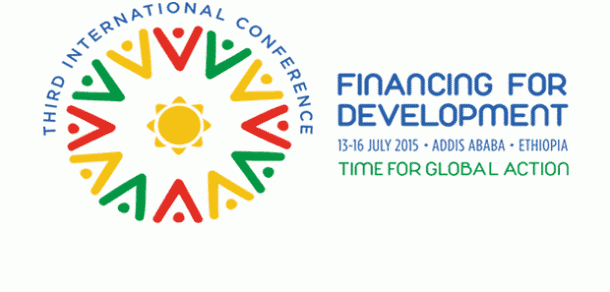We all gathered in the afternoon of Monday July 13, 2015 to witness the launch of Global Financing Facility (GFF) in support of Every Woman Every Child by the United Nations Secretary General Mr. Ban Ki-moon in partnership with African heads of states and leaders of international development organisations. The event took place at the Africa Hall of the UN Economic Commission for Africa in Addis Ababa, Ethiopia during the 3rd United Nations Finance for Development Conference.
At the launch, the World Bank Group announced a new GFF partnership with its International Bank for Reconstruction and Development (IBRD) to raise funds from capital markets for countries with significant funding gaps for reproductive, maternal, newborn, child and adolescent health (RMNCAH).
United Nations, the World Bank Group, and the Governments of Canada, Norway and the United States joined country and global health leaders to launch the Global Financing Facility (GFF) in support of Every Woman Every Child, and announced that $12 billion in domestic and international, private and public funding has already been aligned to country-led five-year investment plans for women’s, children’s and adolescents’ health in the four GFF front-runner countries of the Democratic Republic of the Congo, Ethiopia, Kenya and Tanzania.
During the ceremony the GFF partners also announced the next group of eight countries to benefit from the GFF, with the goal of supporting 62 high-burden low- and lower-middle income countries within five years. The GFF is adding Bangladesh, Cameroon, India, Liberia, Mozambique, Nigeria, Senegal and Uganda as the second wave of GFF countries.The Bill & Melinda Gates Foundation, Canada, Japan, and the United States announced new financing commitments totalling $214 million. This is in addition to commitments previously made by Norway and Canada of $600 million and $200 million, respectively, to the World Bank Group-managed GFF Trust Fund.
Some comments of world leaders on GFF were worth reproducing here;
“Despite the strong gains we have made over the past decade, child and especially maternal mortality remain unacceptably high in Ethiopia,” said Dr. Kesete Admasu, Minister of Health, Ethiopia. “The GFF represents the chance to strengthen our efforts to improve the health of mothers and children, in Ethiopia and throughout the world. By firmly situating reproductive, maternal, newborn, child, and adolescent health—RMNCAH—within the broader health context, the GFF is well-aligned with the Ethiopian context, strengthens our health system, and contributes to our vision of a healthy, productive, and prosperous Ethiopia. I hope it will be possible for many more countries to take advantage of this exciting opportunity.”
“Our vision is clear: to end all preventable maternal, child and adolescent deaths within a generation and ensure that women, children and adolescents thrive,” said Mr. Ban Ki-moon, United Nations Secretary-General. “We need innovative financing at scale and game-changing partnerships to support the updated Global Strategy for Women’s, Children’s and Adolescents’ Health and subsequent Every Woman Every Child movement. Today, I will formally launch the Global Financing Facility in support of Every Woman Every Child, a key financing platform for this updated Global Strategy.”
While the excitement was very high in the afternoon launch, the same cannot be said for the pre launched Open GFF consultation with NGOs by the team managing the GFF at the Jupiter International Hotel. NGOs present particularly those from Africa have raised many concerns and worries which are expected to be taken into consideration during the implementation phase of the GFF.
Africa’s expectation;
- Majority of the African NGOs present expressed concerns of not being actively involved and carried along by their governments during the engagement process as well as being part of the country platforms that will direct the affairs of GFF.
- In the selection of the 2 representatives of NGOs that will join the membership of the GFF Investors Group, the NGOs strongly advocated that one of the representative should come from Africa which so far has 10 of the 12 countries listed to benefit from the GFF. The selection process should be transparent and carry the African NGOs along in determining who should be chosen and that such choice should be someone that has a pedigree of genuine long termed commitment to see the realisation of NGOs participation in the affairs of GFF.
- Improving accountability and transparency of GFF in Africa should be more than the routine financial auditing process by World Bank and its investors but rather should be more engaging and encompassing of performance monitoring and matching financial investments with health outcomes and deepen citizens’ participation and feedback at country level, continental and global.
- The GFF team should support a movement in Africa at regional level that supports regular flow of information and support that will lead to improve performance of GFF as well as support NGOs to be engaged in budget tracking and accountability.
- The capacity of the NGOs in Africa should be enhance to strategically participate in the implementation of GFF. This could be achieve via trainings, mentorship, face to face and virtual interaction.
- Lastly the investors are encourage to provide a separate small grants to NGOs in Africa that allow them to provide oversight and performance monitoring which invariably protects investment and improve transparency and accountability.
While I wish the World Bank GFF all the best in the implementation, it is my wish and prayer that the team study the concerns of the African NGOs and align some of their plans and action with if not all but some of the issues raised.
1st published in Daily Trust Newspaper of 21/07/2015 by Dr Aminu Magashi Publisher Health Reporters & Coordinator Africa Health Budget Network (healthweekly@yahoo.com)




